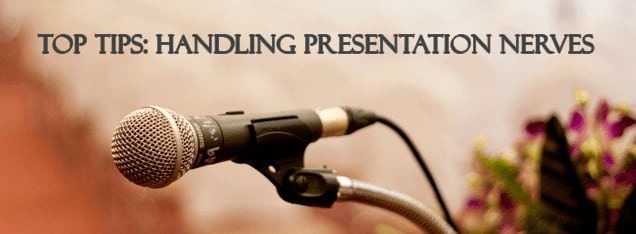
Presenting with Confidence – Handling Presentation Nerves
Making a good presentation depends on the three pillars of content, structure and technique, but underpinning these is also the ability to present with confidence and handle nerves. Being nervous is recognised as natural and is, to some extent, a good thing. "If you are not at all nervous, it can lead to complacency and a lacklustre performance" observes Philip Moon of ProSeminar International. "But", Philip continues, "those nerves need to be managed otherwise they can overwhelm you and completely undermine your presentation."
Philip offers a range of common sense tips for presenters emphasising particularly the importance of good preparation and adopting a positive 'inner-dialogue'.

Spending the right amount of time on preparation is critical. If you skimp on preparation then you start off at a disadvantage. You need to feel confident in the quality of your preparation and that you’re therefore well-equipped when you stand up to talk. This includes having good notes – even if you’re not going to use them. Notes provide a fallback and reassurance that you’ve got it covered just in case you do dry up and completely forget what you were going to say. However you’ve also got to know your material well so that you’re not dependent on your notes. Have the structure clear in your mind and rework your notes several times. It’s important also to rehearse your opening, linking and concluding remarks.
Another aspect of preparation is to make sure you’re familiar with the room layout and any equipment you’ll be using. Make sure that equipment is going to work as you expect, that you can handle it smoothly and that you can deal with anything that might go wrong – you may need to have some kind of contingency. As you familiarise yourself with the environment, think about how you are going to use the space and its implications for the way you’re going to move around during your presentation.
The right inner-dialogue is critical. Don’t 'de-psyche' yourself by letting yourself think 'I’m a bad presenter and this is going to be very boring'. And above all, don’t tell your audience that you are going to be boring! You need to be confident in your right to present and believe that you’ve got something to say which it is valuable for this audience to hear.
Remember your audience is usually on your side and wants you to do well. They are often sympathetic and from their own experiences know how tough it can be to have to do a presentation. If you think your audience is likely to be hostile, challenge this assumption in your own mind. Don’t let a fear of audience hostility make you defensive or hostile in turn. While some sections of an audience may be hostile, it’s unlikely that the whole of the audience will be.
Of course it’s important to get off to a good start. Take a deep breath, look up, see space, smile and begin. Have a well-rehearsed opening section and build rapport with your audience. Don’t worry too much if you make a 'fluff'. Either acknowledge it or keep going. The chances are the audience will either be forgiving or won’t even have noticed. Don’t let one ‘fluff’ undermine your confidence so that one fluff leads to another.
Even if you feel nervous the audience won’t notice it unless you let it take over. Don’t let the fear of being nervous (or being seen to being nervous) make you more so! Get used to handling your nerves by getting used to doing presentations. Actively seek out opportunities to make presentations or perform in public.
"Finally", Philip comments, "remember that whatever happens, you will survive and that at the end of the presentation you will still be a valuable and worthy person!"

ProSeminar International specialises in delivering short, practical workshops on management, communication skills and personal effectiveness.
